- Home
- Alice Hoffman
The World That We Knew Page 3
The World That We Knew Read online
Page 3
Hanni took a leather purse from her pocket. Inside there was a diamond ring and a pair of emerald earrings, her mother’s treasure from Russia. These jewels were all they had, a payment worth thousands of Reichsmarks, but if anything, the offer further outraged the rabbi’s wife.
“The act of creation is holy! One must have read from The Book of Concealed Mysteries and make a covenant with the Almighty. Who are you to ask for this? You think you can pay for what is God’s to give! No, I’m sorry, you must look elsewhere for another kind of help.”
Hanni was beside herself. She could feel her daughter’s chance slipping away. “You’re a mother! I thought you would understand!”
“I understand that we must adhere to God’s will. You’re looking into things you have no right to know about. Go home to your mother and your child! Leave us alone.”
Ettie was told to usher their guest out. The rabbi’s wife must return to bed before her husband woke and took note of her absence. She was nothing, a wife and a mother, not a magician. “Don’t come here again,” she told Hanni, whose face was now streaked with tears. “If you think I don’t understand, I do. But I am smart enough to know that sometimes you have to give up and leave things in the hands of the Almighty.”
Ettie led Hanni from the kitchen. Perhaps the rabbi’s daughter knew how broken she was, for as they walked the red-haired girl leaned in close to whisper. She smelled of cloves and lamp oil.
“I can help you. I know how to do it.”
Hanni stopped, her heart hitting against her chest. The two were huddled in a corner by the door.
“How do you know?” Was it possible that someone so young could be party to anything concerning this sort of business? Tante Ruth had said only men could bring a golem to life.
The rabbi’s daughter shrugged and was evasive. “Trust me, I know.” The girl had almond-shaped eyes and skin dusted with freckles. A line of worry crossed her forehead as she gazed over her shoulder to make certain her mother wouldn’t appear before she spoke further.
“Why should I believe you?” Hanni asked.
“I’ve watched them,” Ettie told her. “My father and his students gathered not long ago. It was an experiment to see if such a being could be created again, as it was in Russia. It was accomplished, here in this house. I sat outside the door and I can memorize whatever I hear. It’s a gift I have. I can recall what my father said, word for word.”
Hanni was damp with sweat. If the impossible was possible, who was to say a girl could not perform magic? “Are you sure? The results will be correct?”
The rabbi’s wife had gone back to bed, and the house was utterly still. All the family, including Ettie’s favorite sister, Marta, were asleep in one cold bedchamber. Hanni and Ettie continued to whisper.
“When you deal with spirits,” the girl went on, “you don’t know exactly what you will get. A golem can be like a dog, following at your heels, or it can be more, perceptive, intelligent really. I have heard my father teach about such a thing. It may look human, but it has no soul. It is pure and elemental and it has a single goal, to protect. I saw the one they made, a huge man. I looked through a crack in the door with one eye, but one eye was all I needed. It came to life naked and eager to do their bidding. But my father made an error, which can happen even to the wisest of scholars, and the creature was too strong. It was growling, and when it grabbed a lantern it didn’t even notice its fingers were aflame. It might have burned the house down. I heard them say it was uncontrollable. If they didn’t act, nothing would be able to stop it from doing as it pleased. So they did away with it. They hadn’t used the right ingredients. They dug soil from our yard, but it wasn’t pure enough. Clay that has never been used for any purpose must be found. My father and his students laid the creature back to rest; they reversed what they had done. They walked backward in a circle, erased what they must, and let him become the dust he had been before he’d been called up.”
“So just like that, they disposed of it?”
“You must understand one thing. It cannot have a long life span. There is danger in letting it exist for too long. My father taught about what could happen, and often the maker of the creature is its first target. All things yearn to be free, even a monster wants that for itself. But for the time you need it, it will complete its duties. But of course, you must earn such an undertaking.”
“What must I do to earn it?” If she must be free of sin, then surely Hanni would fail whatever test the Almighty might place before her. “I’m a woman who has done as I must.”
All at once Ettie noticed the blood under Hanni’s fingernails, which she could not wash away. “I don’t care what you’ve done. In this situation, we both have to share the burden.”
Ettie was prettier than she’d first appeared, or perhaps it was the strength of her inner spirit that was reflected outward. Many young men had fallen in love with her and discussed marriage with her father, but he always told them, You would be happier with someone else, and after a while no one asked anymore. They saw that she wanted things no woman should want.
“If we go forward,” Ettie went on, “I would be putting myself at great personal risk. If I recite anything incorrectly I will immediately die. And if I make my father’s mistake, the thing could be strong enough to kill me. I will be its maker, responsible for what it does in the world. You must wonder what would make me take this chance?” The girl met Hanni’s gaze. “There is something I must have as surely as you must have your golem. I don’t plan to stay here because my father is too filled with pride to run away. I will do what anyone with any sense is doing and leave Berlin. And I’ll take my sister.” Her plan was forming as she spoke. They would go first to France, then to New York, where they had cousins. “Identity papers are expensive, and so is the passage.”
It was now clear to Hanni. The girl didn’t care about any sins Hanni might have committed. She wanted the jewels.
The moon had come from behind the clouds and shone through the window. In that illuminated moment they understood their fates were intertwined, and that one was impossible without the other.
“So we have a bargain?” Ettie said.
“You’re sure? You’re not too afraid?” Hanni asked. The rabbi’s daughter was only a few years older than her own child.
“Do I appear to be afraid? Look closely. You’ll see exactly who I am.”
Hanni saw a girl who was willing to do anything to save herself and her sister. “Fine,” she agreed. “We go forward.”
Ettie put out her hand for payment, but Hanni shook her head. Bobeshi had always told her to wait and see what is revealed before you walk through a door. There might be demons waiting on the other side. As always, she followed her mother’s advice.
“You’ll have it when I get what I want.” Hanni was sure of herself. And why not? This was a forbidden bargain they were making, one sinner to another.
Though Ettie was still a girl, and had rarely ventured from this house, she had the confidence of an experienced woman. “Fine. Those are reasonable terms. But if I die doing your business, then the jewels go to my sister. Someone should profit from what is attempted here whether or not it succeeds. And I want two tickets on the night train to Paris.”
As the eldest of the children, Ettie hadn’t felt young in some time. She had a special bond with her sister, and had cared for Marta when she was little more than a baby herself and her mother was too busy with the children that followed. She had decided upon Paris because even though France had surrendered, no one believed that the city would fall for long. From there, the world would be open to them. Ettie had already resolved that she and her sister would leave together, for what good is it to rescue yourself if you leave behind the person you love most?
“How can I get the tickets?” Hanni couldn’t simply pick them up. Jews were not allowed in the streets, much less the Pulitzerstrasse Station.
“Pay a Christian to do it for you. Someone willing to take a risk for a
price. Use one of the emeralds.” When Hanni seemed as if she might argue this point, Ettie gave her a good reason to find such a fool. “And be sure he buys two tickets for your daughter and her companion.”
Hanni would send Thomas, the janitor, a drunkard who slept in the cellar of their building, to the Pulitzerstrasse Station. For a bit of cash, he could obtain the tickets to Paris from a porter who was willing to exchange four seats on the night train for an emerald.
Now that they were in agreement, Ettie was ready to go forward with the preparations. “When is your birthday?” she asked.
“March first.”
That fell in the current Hebrew month of Adar, an auspicious time for what was needed.
“You were born under the sign of water. I was born under the sign of fire. All we need is a third party born under the sign of air. Luckily, my sister is such a person. Combined with the earth we dig, we’ll have the four elements. That is the way we begin. We must act without fear and without regret.”
“I can do that.” Hanni cared about nothing else.
“Then we have an agreement.”
From now on they were partners in bringing forth life.
CHAPTER FOUR
WATER, FIRE, EARTH, AND SKY
BERLIN, SPRING 1941
HANNI SLIPPED OUT BEFORE DAWN. In the hallway, she sprinkled the last of Ruth’s invisibility mixture over her coat, then made her way through the dark morning. Her heart was already beginning to break, but she was a seamstress and she stitched herself together well enough so that she could go forward. She felt light-headed as she raced along the quiet street, fearing that the rabbi’s daughter would change her mind. It was a relief to spy Ettie and her sister at the arranged meeting spot on the bank of the river Spree. Marta was a quiet, dark girl of fifteen, only three years older than Lea, not a pretty girl, but kindhearted and willing to do whatever her beloved sister insisted she must. Of the two, Marta had always been a follower, a shy, dreamy girl who had rarely been away from their household. She had her father’s large distinctive features, and she wished that she looked more like Ettie, with red hair and light eyes. Now, on the muddy banks of the river, she shivered and wished she were home in bed. It was so early the air was a silvery mist and the calm surface of the water reflected a pale gray. They must use soil that had never been plowed, the damper the better. That had been the rabbi’s mistake, one his daughter was not about to repeat. That is why they had come to the river, despite the danger.
The world was a marvel and, if you didn’t remember what the day would bring, achingly beautiful. The sisters didn’t spy Hanni until she was upon them. She realized how young the girls were; she was old enough to be their mother. But they had come together with a single purpose, firm in their resolve to do what they must. All three wore black dresses and head scarves to hide their long, plaited hair. They walked until they were knee-deep in mud. The sisters had brought along their mother’s large wicker baskets, and were silent as they dug up mounds of damp clay, their backs soon aching with the weight of the wet soil. Marta paused to take a breath. In the past, her sister had done all of the hard work, but this day was different. There was more than enough work for three. Beneath the clotted clouds, there was already a pale band of light in the sky as time spun around them.
“Don’t stop,” Ettie urged. She was working with such ferocity she had sweated through her dress. Her hair was wet as well, and her head scarf soaked through. Last night she’d had a terrible dream that she herself was a bird whose feathers were plucked until she was bleeding and bare. She had wings, but they did her no good. She had a voice, but no one could hear her call. She feared the Almighty’s punishment for what she was about to do. But a bargain was a bargain, and what was promised would be granted.
Her father was a great rabbi, but she was the one who had a true talent. For the thousandth time she wished she were a boy. She had no interest in marriage or babies, only in the world of scholars, from which she was prohibited. She could taste the bitter dirt as they finished digging, and she nearly choked on it. It occurred to her that once she broke the rules of her family and her faith, there would be no going back. But on this morning, all she knew was that she wanted to live. She nodded to her sister, and Marta nodded in return. They were in this together.
Before long there would be light and soldiers would be posted on the streets. The air was gauzy, a haze that was filmy and oppressive. But perhaps the Almighty was looking over them; the horizon remained dark, which allowed them to walk in the shadows. The deed they were attempting must be accomplished before dawn, and the rabbi’s followers would be at the door soon after for their secret prayer gathering, rocking back and forth in praise of God as the sun rose. This was the end, this was the beginning, and they had no time for doubt.
The women slipped into the doorway, then went along the dark corridor until they had reached a small wooden door leading to the cellar. It was kept locked, but Ettie had taken the key from her father’s key chain. They had dug a pile of sopping earth that was three cubits long, an ancient measurement that was varied, for a cubit stretched the length from elbow to fingertips, a different length for each man or woman who had measured, approximately eighteen inches. Ettie began to cast clods of earth onto the cold, dank floor. The mound of clay was frightening, a mountain of gloomy darkness. The room itself was foul, a place where the rabbi’s wife kept potatoes and onions in barrels. Some of the rabbi’s most precious belongings were stored on a wooden shelf, for no one would think to look here. Ettie went to fetch a flask of pure water, collected in a rain barrel, kept for ritual cleansings. She poured it over the mud, then kneaded the sacred water until the mud became clay. The mixture looked less dreadful then, ready to be shaped.
Quickly, Ettie bent to smooth out the clay, forming legs and a torso, arms and a head. Each limb corresponded with a letter in the Hebrew alphabet; with the formation of the body there was a combination of four letters of the Tetragram of God’s name. Ettie went back in her mind to all she had overheard about opening the 221 gates that led to God’s knowledge. If she did so incorrectly, the mud on the floor would remain lifeless and hollow. If she erred in a way that was an affront to God, she herself might burst into flames. There were dangers abounding, and yet she felt oddly composed as she began to chant. This was her calling, what she had always been meant to do, had she not been a woman, barred from such holy endeavors. Ever since she was a small child she had been discreetly eavesdropping to learn all she could, her ear set against the door where her father taught his lessons. Now her memory served her well. She could actually see the words she was to say, as if they had been written inside her mind.
In the Sefer Yetzirah, The Book of Formation, the individual must take the letters of the Hebrew alphabet through each of the gates of both the mind and the spirit. Bereshit bara. In the beginning. He created. But could she? Was a mortal woman allowed to be so brave? The clay suddenly seemed monstrous, and Ettie hesitated, unsure if it was even possible for a woman to have the power of creation. She had been a sinner all her life, refusing to do as she was told, holding on to dreams that were improper for someone of her age and sex.
“Perhaps my mother is right,” she wondered aloud. “It may be that women are not meant to bring such a creature to life or to walk through the gates of knowledge.”
“Of course it’s possible,” Hanni said in a reasonable tone. “Women create life, and therefore shouldn’t those gates open all the more easily to us?” She knelt beside Ettie. Their arms were smeared with slick black mud. “Make certain it is able to have a voice.”
“You want it to speak? Are you positive?” Golems were not meant to have the ability to talk back or argue.
But Hanni nodded, sure of herself. What good would a silent, lurking monster be? The creature that protected her daughter must be able to speak up on her behalf, as a mother would do. Ettie went on to make an indentation for a mouth, then moved the clay to form eyes and a nose as well. But there was mo
re that Hanni desired for her daughter’s guardian. From an inner pocket of her jacket, she brought forth a garment she had been sewing. She had made a simple but perfectly tailored dress, gray with white buttons. Leaning close she whispered, “Make certain it’s a woman.”
Ettie turned pale. There had been tales of female golems, made secretly for depraved personal use, for housework or slavery or sex, but most legends spoke of male creatures. “My father said a golem must be created as Adam was. All that I know, I learned from hearing what he did. I wouldn’t know how to create a female.” By now the rabbi’s daughter was trembling. Brave as she was, she feared the punishment that awaited anyone who tried and failed to create life out of dust.
“As a woman you can form the creature in your image.” If such an undertaking was blasphemy, then wasn’t every act they were committing on this night directly opposed to the expected conduct for women, who themselves were made of a man’s rib? Hanni was not about to trust a male monster with her daughter. It must be a woman. A mother figure who would feel not a forced duty, but real, tangible love. To make sure of this she had saved a vial of her tears, which she now poured over the creature’s eyes. See as I see. Do as I would have. Be who I might have become.
Ettie’s face had a somber expression. Perhaps it was wrong to create a woman, but the creature belonged to Hanni and this was her choice. Ettie did as she was asked, fashioning clay breasts and an indentation to serve as the being’s sex. When she observed what had been wrought, she was disappointed to see the clay being looked neither male nor female.
“Do you have your monthly bleeding?” Hanni asked. “If we add blood perhaps that will let the creature know what she is and God will not be offended by what we do.”

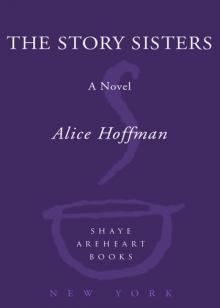 The Story Sisters
The Story Sisters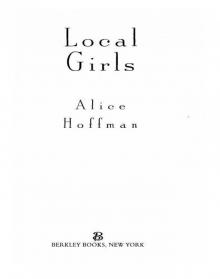 Local Girls
Local Girls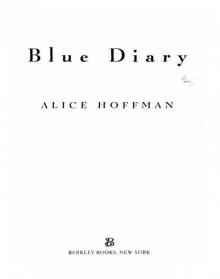 Blue Diary
Blue Diary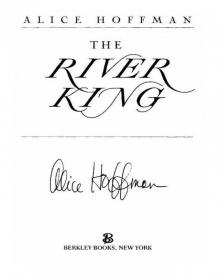 The River King
The River King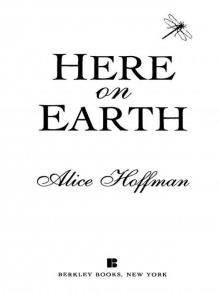 Here on Earth
Here on Earth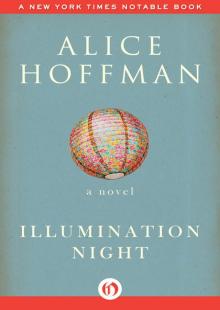 Illumination Night: A Novel
Illumination Night: A Novel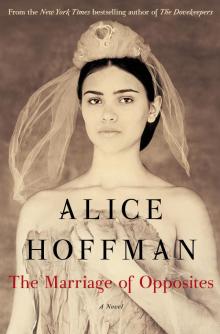 The Marriage of Opposites
The Marriage of Opposites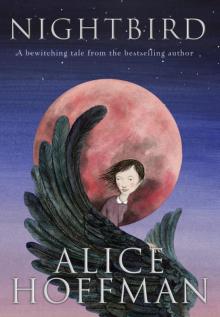 Nightbird
Nightbird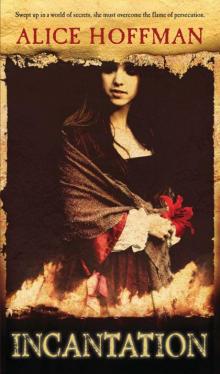 Incantation
Incantation Skylight Confessions
Skylight Confessions The Ice Queen
The Ice Queen Second Nature
Second Nature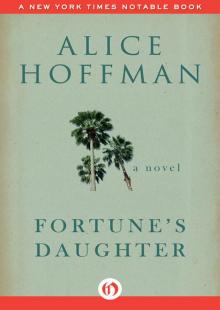 Fortune's Daughter: A Novel
Fortune's Daughter: A Novel Seventh Heaven
Seventh Heaven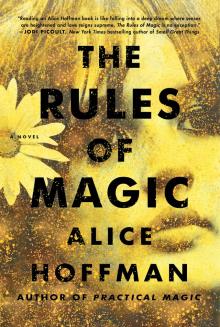 The Rules of Magic
The Rules of Magic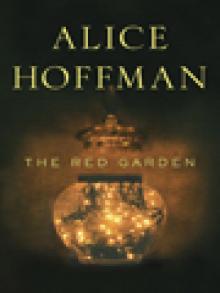 The Red Garden
The Red Garden The Third Angel
The Third Angel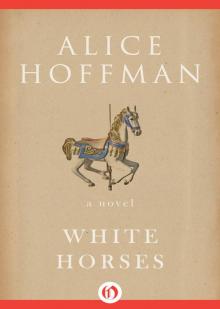 White Horses
White Horses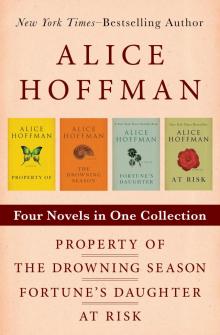 Property of / the Drowning Season / Fortune's Daughter / at Risk
Property of / the Drowning Season / Fortune's Daughter / at Risk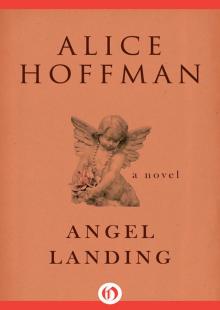 Angel Landing
Angel Landing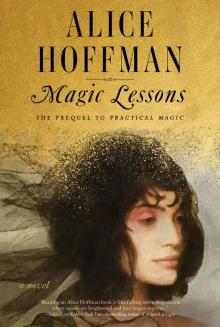 Magic Lessons
Magic Lessons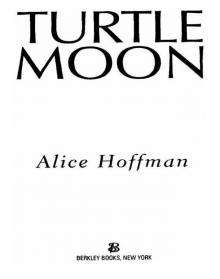 Turtle Moon
Turtle Moon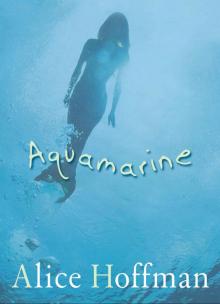 Aquamarine
Aquamarine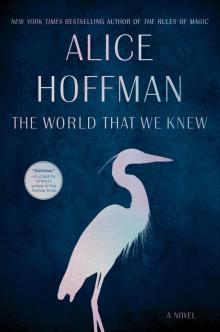 The World That We Knew
The World That We Knew Faithful
Faithful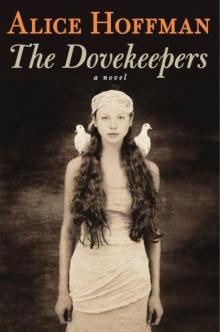 The Dovekeepers
The Dovekeepers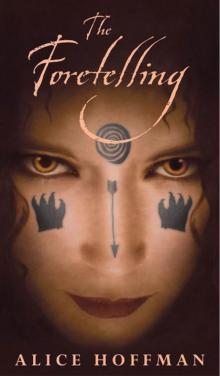 The Foretelling
The Foretelling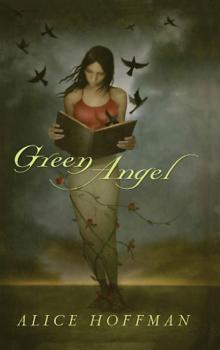 Green Angel
Green Angel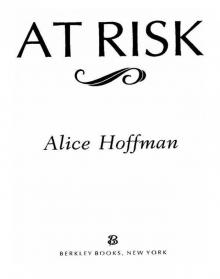 At Risk
At Risk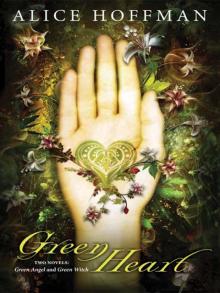 Green Heart
Green Heart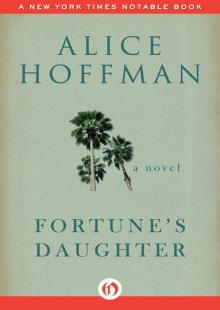 Fortune's Daughter
Fortune's Daughter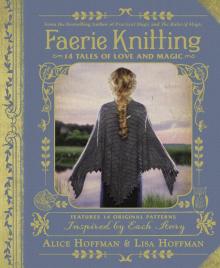 Faerie Knitting
Faerie Knitting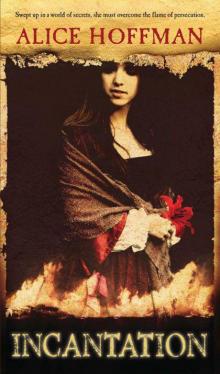 Incantation (v5)
Incantation (v5)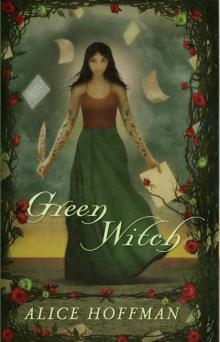 Green Witch
Green Witch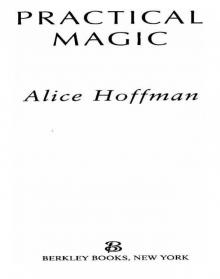 Practical Magic
Practical Magic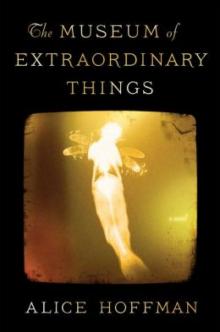 The Museum of Extraordinary Things
The Museum of Extraordinary Things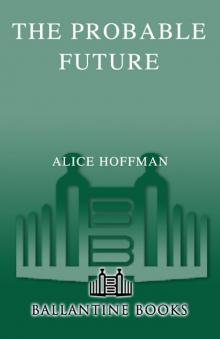 The Probable Future
The Probable Future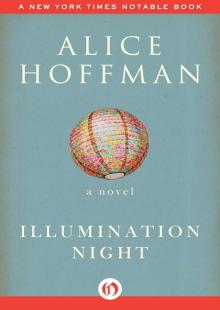 Illumination Night
Illumination Night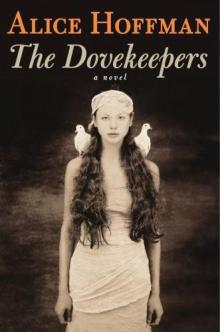 The Dovekeepers: A Novel
The Dovekeepers: A Novel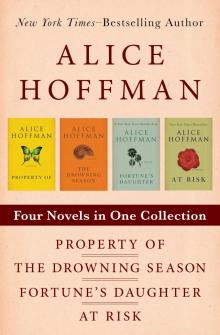 Property Of, the Drowning Season, Fortune's Daughter, and At Risk
Property Of, the Drowning Season, Fortune's Daughter, and At Risk